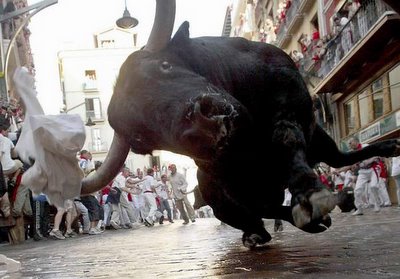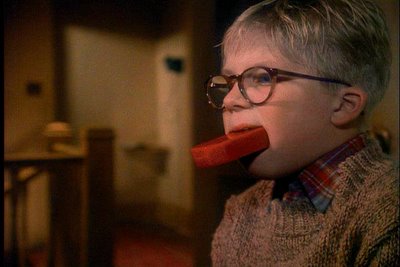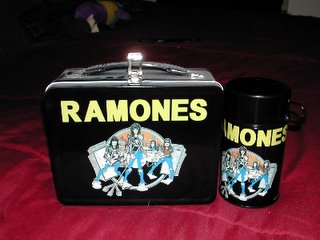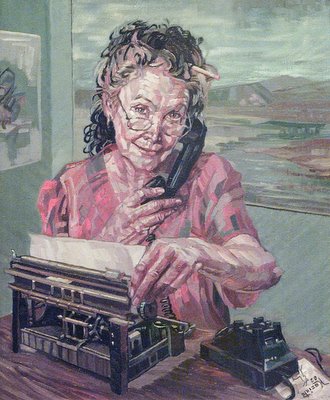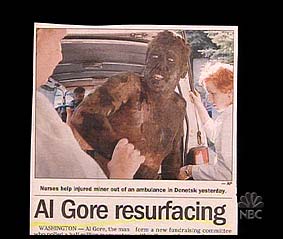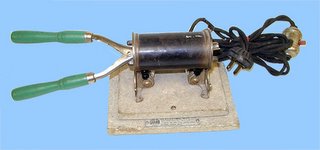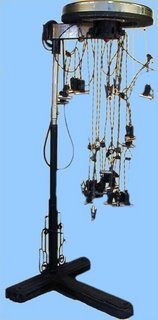I am too busy right now to be of much use to the blogosphere.
So today I thought I'd try something new. Instead of just reguritating lamer news stories about lamesters doing lame-os, (but always with that special sauce that makes Heigh-ho the internet fast food giant that it is), I am going to regurgitate old law junk I've created and try to pass it off as something interesting to read!**
Okay, where to start? I got it! How about a nice little ditty on the "Hobbs Act?" No, I said the "Hobbs Act." H-O-B-B-S space A-C-T. No, it has nothing to do with a tiger
or a kid peeing on a NASCAR number in the back window of a pickup truck. Why do you ask?
It's about
(drum roll) political corruption!!!!!! *** Okay, wake up back there in the ...back.
This could actually interest you. Probably not, but you never know. Have you ever made a
bribe or offered a kickback campaign contribution to a government official?
Me neither.
But lots of other folks do, and they need to know stuff like: "
When I stuff hundreds into the cleavage of the candidate's hot trophy wife for lap dances, what percentage of that is tax deductable?"Of course, I haven't a clue. I'd check with your tax advisor to see whether the value of a lap dance has been keeping with inflation. But I do know that if you give a thing of value to an official, elected, appointed, or otherwise barely breathing carbon unit waiting until its safe to suck off the big retirement tit of your federal, state, or local government, you
get a lot more accomplished you must be careful of appearances.
So, without further ado, I give the first installment of my forthcoming bestseller,
"The Compleate Guide To Extortion: How You Can Do It Yourself And Feel Good About It: Using the Hobbs Act for Fun and Profit."Enjoy.***************************************************************************The Hobbs Act, 18 U.S.C. 1951, provides, in pertinent part:
(a) Whoever in any way or degree obstructs, delays, or affects commerce or
the movement of any article or commodity in commerce, by robbery or extortion or
attempts or conspires so to do, or commits or threatens physical violence to any
person or property in furtherance of a plan or purpose to do anything in
violation of this section shall be fined not more than $10,000 or imprisoned not
more than twenty years, or both.
(b) As used in this section
…
(2) The term “extortion” means the obtaining of property from another, with
his consent, induced by wrongful use of actual or threatened force, violence, or
fear, or under color of official right…. [1]
Should a public official promise to act in his official capacity in exchange for a thing of value to which neither he nor his office is entitled, that official has committed extortion in violation of the Hobbs Act. See, United States v. Mazzei, 521 F.2d 639 (3rd Cir. 1975). The public official need not initiate the transaction or make an affirmative demand for money or other things of value to violate the act.
The official acts performed or promised to be performed that have given rise to Hobbs Act prosecutions touch upon every kind of governmental function; casting votes in legislative bodies, licensing agencies, regulatory boards or commissions and zoning authorities, issuance of permits or licenses or influencing the termination of enforcement actions or prosecutions. The “things of value” that have been conferred on public officials include items from cash to gifts of tangible personal property, use of vacation properties, intangible business rights, clothing and jewelry, and sporting events tickets.
Passive acceptance of a thing of value by a public official is sufficient to form the basis of a Hobbs Act violation if the official knows that he is being offered a payment of money or other thing of value in exchange for a specific exercise of his official power[2] See, Evans v. United States, 504 U.S. 255, 258-59 (1992). The exercise of official authority or a promise to exercise such authority is an essential quid pro quo necessary to establish a Hobbs Act violation. Fulfillment of the quid pro quo is not an element of the offense, however, because the violation is completed when the public official receives a payment in return for his agreement to perform, or refrain from performing, an official act. Id. at 268. Even if the official’s promise to perform an official act is worthless because the official does not have the authority to carry out his promise, the quid pro quo is deemed fulfilled upon the official’s acceptance of payment.
The Act requires that there be some interference with interstate commerce. Courts, however, have broadly interpreted that requirement. The Third Circuit has held where the resources of an interstate business are depleted or diminished in any manner by extortionate payments, “the consequent impairment to conduct an interstate business is sufficient to bring the extortion within the play of the Hobbs Act,” even where such the burdens placed on commerce are indirect. Mazzei, 521 F.2d at 642.
The Supreme Court has ruled that “extortion…in no way depends upon having a direct benefit conferred on the person who has obtained the property,” United States v. Green, 350 U.S. 415, 420 (1956). For example, the performance of an official act in return for a contribution to the official’s political party has been held to violate the Hobbs Act. It is necessary, however, that there be both a deprivation to the victim and an acquisition of property by the official for extortion to exist under the Act. The public official must “obtain” something of value that he can “exercise, transfer, or sell.” United States v. Nardello 393 U.S. 286, 290 (1969); see also, Scheidler v. National Organization For Women, Inc., 537 U.S. 393 (2005) (holding that merely depriving a person of their property right of exclusive control of their business assets was insufficient to constitute extortion under the Hobbs Act where the official could not exercise the property right so deprived).
A recent case, United States of America v. Joseph Hoffman, 2005 WL 762100, slip op. (E.D.Pa. Apr. 4, 2005), 66 Fed. R. Evid. Serv. 1121, is instructive regarding application of the Hobbs Act to actual crimes versus attempted crimes. Although certain aspects of the alleged crime (conspiracy) were not fully consummated, the court held that because the indictment properly alleged an attempt to violate the Hobbs Act, the crime was complete when the Defendant agreed to accept payoff.[3] See also, United States v. Jannotti, 673 F.2d 578, 591-94 (3d Cir. 1982) (holding that jurisdiction over attempted Hobbs Act violations was proper because the defendants had agreed to do acts, which had they been attainable, would have affected interstate commerce); United States v. Rindone, 631 F.2d 491, 494 (7th Cir. 1980) (holding that the offense of attempted extortion is complete when the bribe is solicited and before money is actually transferred).
The district court stated in Hoffman that
In an attempt case, “[t]here is no requirement that there be an actual effect on
interstate commerce – only a realistic probability that an extortion will have
an effect on interstate commerce.” United States v. Peete, 919 F.2d 1168, 1774
(6th Cir. 1990); see also, United States v. Rodriguez, 360 F.3d 949, 957 (9th
Cir. 2004) (finding that Hobbs Act attempt convictions may be based on sting
operations); United States v. Bailey, 227 F.3d 792, 797 (7th Cir. 2000) (stating
that “because Hobbs Act criminalizes attempts as well as completed crimes, the
Government need not even prove that interstate commerce was affected, only that
there exists a realistic probability of an effect on commerce”).
Hoffman, 2005 WL 762100 at *2
In a footnote, the district court in Hoffman provided the following example of the considerable reach of the Hobbs Act when assessing the potential impact of a violation on the Commerce Clause:
Although the Government need not prove an actual effect on interstate commerce
in order to prove an attempted Hobbs Act violation, the Government notes that in
this case several taxi companies which operated in interstate commerce were
affected because the liabilities of the several taxi companies to the City of
the Philadelphia were reduced. See, e.g., United States v. Peete, 919 F.2d at
1175 (“the [Hobbs Act attempt] case before us is easy because the Government
alleged and proved that the private business that [the defendant] solicited was
engaged in interstate commerce”). Thus, the Government presented evidence that,
even though F.B.I. money was used, Hobbs Act violations occurred because there
was a reduction in the ticket liabilities of the taxi companies that operated in
interstate commerce.
Hoffman, 2005 WL 762100 at *2, n.3
One important exception to the foregoing involves political campaigns. Absent unusual circumstances, promises made by candidates, including incumbents, to supporters in return for campaign contributions will generally not constitute violations of the Hobbs Act. Courts have viewed the political process as one in which the inducement of financial contributions in response to campaign promises is an inherent part of political communication and is therefore protected by the First Amendment to the U.S. Constitution. Thus, a campaign contribution, without more, is not a violation of the Hobbs Act. See, United States v. McCormick, 500 U.S. 257 (1991)[4]
Finally, although such instances are rare, some courts have held that private persons may violate the Hobbs Act prohibition on obtaining property “under color of official right,” where the person holds himself out as being able to exercise control over those who are public officials. See, e.g., United States v. Lena, 497 F.Supp. 1352(W.D. Pa. 1980), affirmed 649 F.2d 861. Generally the “victims” of extortion by a public official “under color of official right,” face prosecution for classic bribery.
In sum, a prudent public official should be take great pains to ensure when offered any “thing of value” that the person offering it has no expectation of receiving any official act in return. A private person should take similar care when offering any thing of value to a public official, lest he run of risk of prosecution for bribery. If there is the slightest doubt as to whether a gift to a public official might be construed as a “transaction” both parties should politely decline.
[1] Although private persons may violate the Hobbs Act through the use of violence or threats of violence (as can public officials) neither fear nor threats of violence are required for there to be a violation of the Hobbs Act by a public official. See, United States v. Kenny 462 F.2d 1205, 1229, (3rd Cir. 1972).
[2] It should be noted that merely accepting of a thing of value by an official does not, in and of itself, violate the Hobbs Act. Officials routinely accept token gifts, lunches, travel expenses, etc., to which neither the official nor the office he occupies, may be entitled, but yet do not violate the Hobbs Act because there is there is no quid pro quo expected.
[3] The Indictment specifically charged that Defendant,
unlawfully obstructed, delayed and affected commerce and the movement of articles and commodities in commerce, and attempted to do so, by extortion, in that, defendant HOFFMAN unlawfully obtained and attempted to obtain property and things of value…under color of official right.”
Hoffman, 2005 WL 762100 at *2, n.2
[4] The “more” being a quid pro quo. “In such situations, the official asserts that his official conduct will be controlled by the terms of the promise or undertaking.” McCormick, 500 U.S. 257 at 273.
**********************************************************************************
There now! Doesn't you head just absolutely
hurt with excitement?
Tune in tomorrow when for the griipping story of "
Due Process of Doom: Voiding for Vagueness in the Heart of the Big City"TTFN.******** For those of you playing at home, the number of words in that sentence was
49.
***(For those of you who are not wing-ding literate, the characters shown emulate the following letters (in no particular order of course):
p-o-l-i-t-i-c-a-l- c-o-r-r-u-p-t-i-o-n)
 Everything Must Go Go Go!!!!
Everything Must Go Go Go!!!!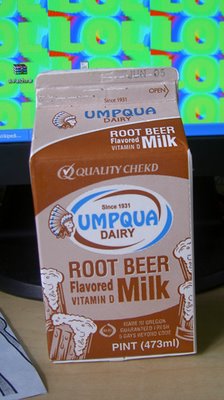
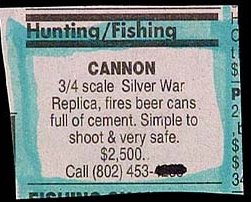
 You don't want me to explain what "Kiss" and "Bajs" mean in Swedish, do you? Just believe me that "Kiss" and "Bajs" were the first two things your parents taught you not to play with.* The marketing concept may perhaps just a little too *cough* European for Yankee sensibilities. You be the judge. Visit their cool website to learn more. Or not.
You don't want me to explain what "Kiss" and "Bajs" mean in Swedish, do you? Just believe me that "Kiss" and "Bajs" were the first two things your parents taught you not to play with.* The marketing concept may perhaps just a little too *cough* European for Yankee sensibilities. You be the judge. Visit their cool website to learn more. Or not. Birds do it. Bees do it.
Birds do it. Bees do it. 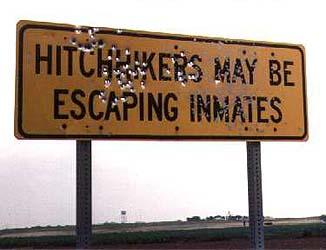
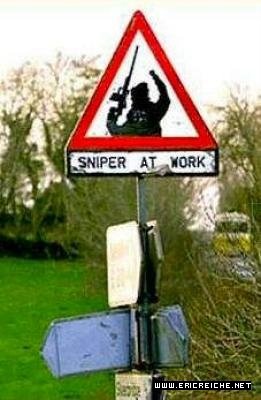
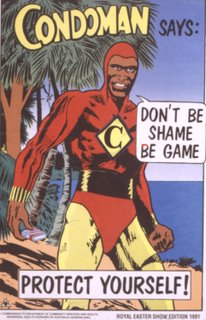

 I'm always spelling "shizzel" wrong.
I'm always spelling "shizzel" wrong. 

